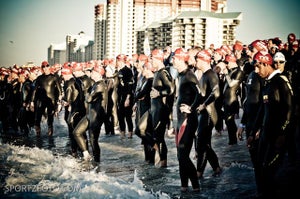Eating Back The Clock: Using Your Nutrition To Stay Healthy As You Age
The right nutrition habits will minimize the negative effects of ageing your health, fitness and performance.
Written by: Pip Taylor
In a triathlon, no concessions are made for anyone. No shortcuts are offered, even for the 80+ age group. Everyone does the same race. The masters’ age groups are growing quickly in many sports, especially in triathlon. Many older athletes are healthier than some people who are half their age and sitting on the couch watching not only their belt but their list of health risks expand. Personally, it is something I aspire to be: out there racing for many decades to come.

But do these mature athletes have different nutritional requirements than their younger counterparts? The truth is there has been little research on the special nutritional needs of older athletes. The majority of sport-specific studies focus on adults in their 20s and 30s and studies of the ageing population are generally done on sedentary (and often very unhealthy) individuals. To begin to formulate an answer to the question above, we need to look at how the body changes with age, and specifically at how the bodies of older athletes differ from those of younger athletes.
The bad news is as we age an inevitable physical deterioration occurs. After the age of 30 there is a gradual decline in muscle mass, while aerobic power and maximal VO2 start to decline after about age 25. Muscle strength also begins to decline after 35 to 40. The good news is the latest evidence suggests that such deterioration is largely due to disuse rather than ageing itself. In other words, inactivity accelerates the underlying physiological ageing processes that result from genetic predetermination and wear and tear. But there is ample evidence to show active individuals, such as those training for and racing in triathlons, are able to offset these declines and maintain excellent health, fitness and strength into their golden years. Consequently, athletes can compete with little performance drop-off until well into their 40s and even 50s. What’s more, if you have been less active in your early years and come into training for sports later in life you are able to make significant improvements in fitness, strength and performance with quality training—changes that effectively reverse the ageing process.
Nutrition plays a key role in enabling all triathletes to engage in quality training, but it becomes even more important after the bulletproof teens and early 20s when you may be able to get away with short cuts in the diet every now and then. It’s not that older athletes have significantly different nutritional requirements, but rather we need to be more diligent in applying good nutritional practices the older we get if we want to maintain good physical fitness and performance. Some key areas to pay attention to are as follow:
Nutrient dense, healthy foods including whole grains, fruits, vegetables, nuts and quality proteins are required for both performance and health. As we age, our caloric needs can decrease slightly so it is even more important the calories consumed are from functional sources instead of empty calories to avoid nutritional deficiencies and minimize body fat storage.